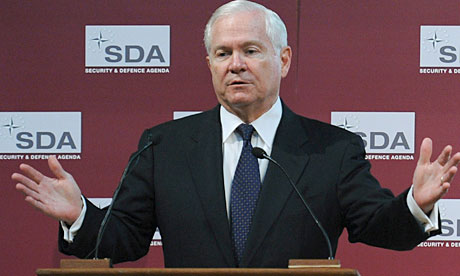Eläkkeelle jäänyt USA:n puolustusministeri Robert Gates varoittaa että NATO voi romahtaa. Syynä eurooppalaisten valtioiden laskevat puolustusbudjetit ja USA:n jopa 75 % noussut osuus liittouman kustannuksista. Meneillään oleva Libyan operaatio on näyttänyt NATO:n eurooppalaisten jäsenvaltioiden heikot resurssit taistella pitkässä konfliktissa. Useiden jäsenvaltioiden pommit olivat loppumassa jo 11 viikkoa operaation alusta, vaikka vastassa on heikko ja kehittymätön vastus.
USA:n on ollut pakko tulla muiden jäsenvaltioiden avuksi ammuspulan takia.
Lisäksi ilma-operaatio on suunniteltu 300 päivittäisen lennon varaan ja liittoumalla on vaikeuksia päästä edes puoleen suunnitellusta määrästä.
NATO:n epävarma tulevaisuus perustuu euroopan maiden laskevien puolustusbudjettien lisäksi liittouman jakautumiseen kahtia. Toisena osapuolena ovat maat jotka haluavat keskittyä vain siviilikriisinhallintaan ja toisena maat jotka edelleen pitävät rauhaanpakottamista ja voimatoimia NATO:n päätehtävänä.
Mm. edellämainittujen seikkojen vuoksi uudet johtajat USA:ssa voivat tulevaisuudessa hylätä turvatakuut euroopalle koska kustannukset nousevat liitouman tarjoamien hyötyjen ohitse.
US defence chief blasts Europe over Nato
Robert Gates blames a failure of political will and defence cuts as he warns that younger US politicians could abandon alliance
Robert Gates delivers a speech on entitled Reflections on the status and future of the transatlantic alliance, warning that Nato risks 'military irrelevance' unless spending is increased by members other than the US. Photograph: Jason Reed/AFP/Getty Images
The US defence secretary, Robert Gates, has warned that a new post-cold war generation of leaders in America could abandon Nato and 60 years of security guarantees to Europe, exasperated by Europe's failures of political will and the gaps in defence funding needed to keep the alliance alive.
In a blistering attack on Europe - which he accused of complacency over international security - Gates predicted a Nato consigned to "military irrelevance" in a "dim if not dismal" future unless allies stepped up to the plate.
"If current trends in the decline of European defence capabilities are not halted and reversed, future US political leaders - those for whom the cold war was not the formative experience that it was for me - may not consider the return on America's investment in Nato worth the cost," Gates, a former CIA chief, warned.
Three weeks before standing down as Pentagon head and retiring from decades at the heart of the US security establishment, Gates used a 20-minute valedictory speech in Brussels to read the riot act to a stunned elite audience of European officers, diplomats, and officials.
Nato had degenerated into a "two-tiered" alliance of those willing to wage war and those only interested in "talking" and peacekeeping, he fumed in his bluntest warning to the Europeans in nearly five years as the Pentagon head.
Washington's waning commitment to European security could spell the death of the alliance, he said. The speech was laced with exasperation with and contempt for European defence spending cuts, inefficiencies, and botched planning.
The Libya mission was a case in point, Gates said, pointing out that the Anglo-French-led campaign was running out of munitions just weeks into operations against an insubstantial foe. The US had again had to come to the rescue of the Europeans in a campaign on Europe's shores and deemed to be of vital interest to the Europeans, he complained.
"The mightiest military alliance in history is only 11 weeks into an operation against a poorly armed regime in a sparsely populated country. Yet many allies are beginning to run short of munitions, requiring the US, once more, to make up the difference."
In March, all 28 Nato members had voted for the Libya mission, he said. "Less than half have participated, and fewer than a third have been willing to participate in the strike mission … Many of those allies sitting on the sidelines do so not because they do not want to participate, but simply because they can't. The military capabilities simply aren't there."
The air campaign had been designed to mount 300 sorties daily but was struggling to deliver 150, Gates added.
Away from the specifics of the current operations in Libya and Afghanistan, Gates charged Europe's leaders with lacking the political will to sustain Nato, complained bitterly about unending defence budget cuts, but conceded that the reduction in spending was probably irreversible.
The US share of Nato military spending had soared to 75%, much more than during the cold war heyday when Washington maintained hundreds of thousands of US troops across Europe, he said. The US public would not stand for this much longer.
Congress would rebel against spending "increasingly precious funds on behalf of nations apparently willing and eager for American taxpayers to assume the growing security burden left by reductions in European defence budgets", he said.
Noting he was 20 years older than Barack Obama, Gates said his peers' "emotional and historical attachment" to Nato was "ageing out".
"In the past, I've worried openly about Nato turning into a two-tiered alliance, between members who specialise in 'soft' humanitarian, development, peacekeeping, and talking tasks, and those conducting the 'hard' combat missions ... This is no longer a hypothetical worry. We are there today. And it is unacceptable."
http://www.guardian.co.uk/world/2011/jun/10/nato-dismal-future-pentagon-chief

